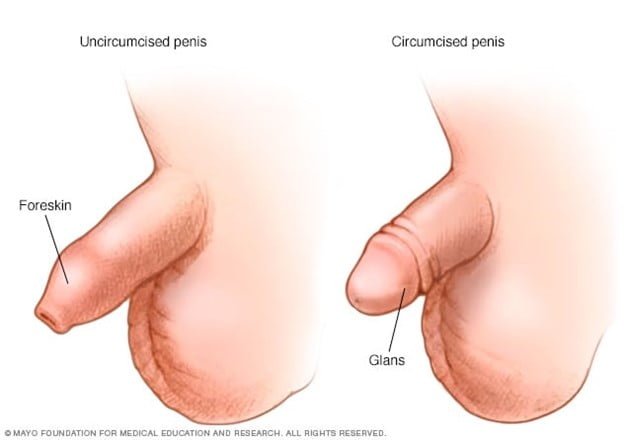A lot of people think that circumcision impacts premature ejaculation in men. Does it really impact premature ejaculation? What do scientific studies say?
Let’s find out…
Table of Contents
What is Circumcision?
In newborn male children, the surgical removal of the penile foreskin (prepuce), skin covering the tip of the penis, is called circumcision. Circumcision has its roots in century-long religious and cultural teachings. In modern times, it is a widespread practice in the United States, France, the United Kingdom, and other parts of Europe.
It is done by trained medical professionals with proper hygienic handling, pain control, and surgical techniques. Circumcision may be delayed or contraindicated in some male newborns. This is true for unhealthy newborns, those with a bleeding disorder, and those with anatomic penile malformations.
Here is what a circumcised vs. uncircumcised penis looks like:

Circumcision is much more than a religious ritual. A circumcised penis has multiple scientifically proven health benefits that can’t be denied. These include:
- Reduced risk of urinary tract infection
- Decreased risk of penile cancer
- Prevention of penile problems in adulthood
- Decreased risk of STDs (sexually transmitted diseases) including HIV.
Despite these health benefits, it is still believed to cause premature ejaculation.
Does it?
Does Circumcision Cause Premature Ejaculation?
Circumcision has no significant negative impact on intravaginal ejaculatory latency time (IELT). A meta-analysis that reviewed 12 studies found that there is no significant impact of circumcision on premature ejaculation. PE is independent of circumcision and the physiology and shape of your penis. Both circumcised and uncircumcised men have an equal chance of suffering from premature orgasm.
Some studies, however, found that circumcision improves IELT which means men who have a circumcised penis are less likely to suffer from premature ejaculation. One study found that 95.7% of circumcised men have better control over ejaculation.
A China-based study analyzed 575 circumcised and 623 uncircumcised men for 5 years and found that circumcision has a positive effect on ejaculatory control, IELT, sexual satisfaction, and premature ejaculation severity.
This is because more than 50% of the mucosa and skin from the penis are removed during circumcision. This removes a lot of free-touch corpuscular receptors from these parts of the penis. The exposed glans penis becomes keratinized and cell layers in the epithelium of the glans penis increase significantly. This desensitizes your penis to a great extent which leads to delayed ejaculation.
The clinical evidence suggests that by desensitizing the penis, circumcision might positively impact the intra-vaginal ejaculatory latency time. For circumcised men, this simply means a longer ejaculatory time.
Think of circumcision as the natural way to desensitize your penis for your entire life.
Circumcised Vs. Uncircumcised Men
Circumcision is the first surgical procedure performed on the genital of males, it is logical to assume it might impact sexual function. Many people think that it might impact their sexual function. Not just the people, the stats and clinical evidence recorded so far seem to support this school of thought.
For example, compared to circumcised adults, sexually active uncircumcised males are most likely to have penile complications including penile inflammation and urinary tract infections. This population of men also expresses a higher risk of penile infection, male sexual dysfunction, premature ejaculation, urethral blockage, loss of sexual stimulation and penile sensation in adulthood, and in rare cases lifelong premature ejaculation.
Another important consideration in uncircumcised adults is the high risk of infections they carry. The unremoved prepuce contains ectopic sebaceous glands that produce secretions. The subpreputial epithelium that covers the glans is made of wet epithelial cells. With these structures intact, the uncircumcised man is exposed to a risk of sexually transmitted infections (STIs) including herpes simplex virus, syphilis, HIV, and gonorrhea.
The microbial make of the prepuce secretion put the uncircumcised man at risk of community-acquired infections. Circumcised men have a significantly lower burden of infections and penile complications during sexual activity.
Maximum Age for Circumcision
Since circumcision helps you delay ejaculation and has numerous health benefits if you aren’t circumcised, what options do you have?
Clinically, there is no age to get your penis circumcised. If you are uncircumcised, you can undergo surgery and have it circumcised.
However, the best age for circumcision is 7 days. When a newborn is 7-8 days, that’s the time when circumcision must be performed to avoid complications and quick recovery. In a study of 603 children, the ideal age was found to be under a year as it reduces anesthesia complications and costs.
But this doesn’t mean adults can’t have circumcision. You can have your penis circumcised at any age. However, it might cost you way more than what it costs a 7-day old baby. If you can bear the cost, you can undergo circumcision surgery.
How Circumcision Impact Sexual Health
Research evidence suggests the positive impact of male circumcision on ejaculation time. This study compared ejaculatory time and self-reported scores of sexual performances in 47 selected patients who had recently undergone the removal of foreskin remnants (complete circumcision in adulthood).
The data suggests that the circumcised men reported higher IELT scores, increased ejaculation time, better control over ejaculation, and increased frequency of orgasm in their partners.
In a similar study, researchers reported a significant increase in intravaginal ejaculation latency time after circumcision.
Circumcision in men seems to moderately reduce sexual arousal during intercourse and help men relax and control the arousal cycle better. So, circumcised men have better voluntary control over ejaculation, better sex, and better sexual satisfaction.
Improved sexual performance due to circumcision has a profound positive impact on self-confidence and reduces the feeling of shame, depression, and inferiority.
Should You Get Circumcised to Treat PE?
No, you shouldn’t.
Circumcision is scientifically proven to improve ejaculation time and sexual performance, but it isn’t a treatment for premature ejaculation. There is no scientific evidence that shows it is a cure for premature ejaculation.
If you are suffering from PE and you get circumcised, it is most likely that you will still have the same IELT. So, you shouldn’t get circumcised to cure premature ejaculation and to delay orgasm. It won’t work.
Besides, the IELT difference between uncircumcised and circumcised men isn’t way too much. The average increase reported was no more than 30 seconds. I’m sure you won’t be OK to spend thousands of dollars on circumcision to increase merely 30 seconds of sex duration when there are other cost-effective and risk-free methods available to choose from.
The average cost of adult circumcision is over $3,000 if everything goes well. It doesn’t include additional costs. A delay spray that will help you increase ejaculation time by a minimum of 5 minutes costs $49.95 and lasts a month easily.
Make the right choice. Circumcision is great but it won’t treat premature ejaculation. If you want to improve ejaculation time and get control over orgasm, try this delay spray here.

